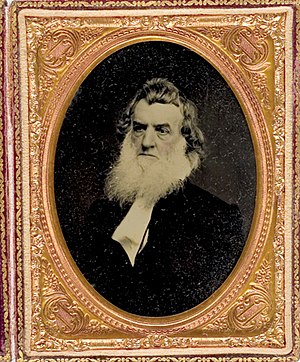 Image of Gideon Welles via Wikipedia
Image of Gideon Welles via WikipediaOn Tuesday, October 1, 1861, Secretary of the Navy Gideon Welles announced that the U.S. Navy would not be issuing letters of marque.
The Confederate Navy had been using privateers to disrupt Northern shipping since the earliest days of the war. It was state-sanctioned piracy -- letters of marque were issued to private ship captains to attack and capture enemy vessels and bring them before admiralty courts for prize money.
Privateering was a viable tactic for a weaker naval power such as the Confederacy, which had few ships and few resources to build a fleet. Armed ships and men could be mobilized to wreck havoc on Northern commerce, drawing U.S. resources away from the blockade and other duties. In many cases, the privateers were employed as blockade runners.
Welles kept has opinion on privateering to himself and no letters of marque were issued. Finally, on October 1, Welles's position was revealed and made official. His chief objection to privateering was that it would "be a recognition of the assumption of the insurgents that they are a distinct and independent nationality."
NAVY DEPARTMENT, WASHINGTON, Oct. 1, 1861.
SIR: In relation to the communication of R.B. FORBES, Esq., a copy of which was sent by you to this Department on the 16th ult., inquiring whether lettersof-marque cannot be furnished for the propeller Pembroke, which is about to be dispatched to China. I have the honor to state that it appears to me there are objections to, and no authority for, granting letters-of-marque in the present contest. I am not aware that Congress, which has the exclusive power of granting letters-of-marque and reprisal, has authorized such letters to be issued against the insurgents; and were such authorization, I am not prepared to advise its exercise, because it would, in my view, be a recognition of the assumption of the insurgents that they are a distinct and independent nationality.
Under the act of Aug. 5,1861, "supplementary to an act entitled 'An act to protect the commerce of the United States and to punish the crime of piracy,'" the President is authorized to instruct the commanders of "armed vessels sailing under the authority of any letters-of-marque and reprisal granted by the Congress of the United States, or the commanders of any other suitable vessels, to subdue, seize, take, and, if on the high seas, to send into any port of the United States any vessel or boat built, purchased, fitted out, or held," &c. This allusion to letters-of-marque does not authorize such letters to be issued, nor do I find any other act containing such authorization. But the same act, in the second section, as above quoted, gives the President power to authorize the "commanders of any suitable vessels to subdue, seize," &c. Under this clause letters permissive, under proper restrictions and guards against abuse, might be granted to the propeller Pembroke, so as to meet the views expressed by Mr. FORBES. This would seem to be lawful, and perhaps not liable to the objections of granting letters-of-marque against our own citizens, and that too without law of authority from the only constituted power that can grant it.
I have the honor to transmit herewith a copy of a letter from Messrs. J.M. FORBES & Co. and others, addressed to this Department, on the same subject.
I am, very respectfully, your obedient servant, GIDEON WELLES.
Also on this date, the Confederates held a council of war at Centreville, Virginia. Confederate President Jefferson Davis conferred with Generals Joe Johnson and Beauregard. The Confederacy would remain on the defensive, concentrating the armies and awaiting McClelland's advance in the spring.

No comments:
Post a Comment